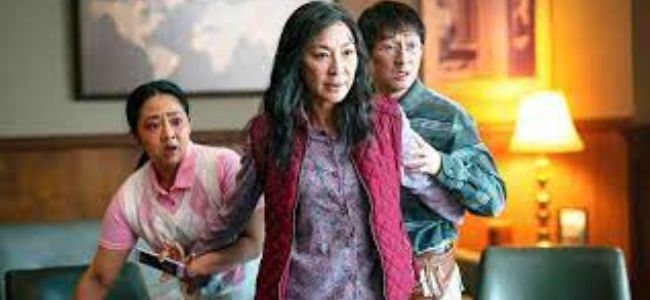Film review: Everything about ‘Everything, Everywhere, All At Once’ Video inside
You have seen it in Into the Spider-Verse and Spiderman: No Way Home. You see it in “Dr. Strange in the Multiverse of Madness.” The multiverse is just a part of an ongoing fascination with asking what-ifs about the world around us.
How would life be if I had said yes? How would life be if I had said no? These questions gave us some time to imagine ourselves somewhere not here, somewhere more enchanting and less demanding of us like the current situation we are in.
That is the situation for Evelyn Wong, played by Michelle Yeoh. Evelyn is trying to run the family laundromat, appease her father, tell her husband what to do and organize a community get-together while navigating her daughter’s coming out. On top of that, she has to file her taxes! (I have been personally victimized by the IRS before, and found out the hard way how many forms I have to fill). Nobody wants to be in the situation Evelyn is in, and we all have a hunch she does not either.

But, in “Everything, Everywhere, All at Once,” fate is merciless on her, and Evelyn is soon bestowed with a new responsibility: rescuing the multiverse from an omniversal entity by verse-jumping into alternate realities to learn different skills. Suddenly, she is alternating between a timeline in which she is a martial art film star, one where she is a hibachi chef and the current, most disappointing reality: one in which she is fighting for her life in an IRS building.
The special effects take the audience on a ride with these characters. As Evelyn travels space and time, she undeniably starts having to answer the questions she has been trying to avoid: Does she truly love her husband for the way he is? Why is she so miserable?
“Everything, Everywhere, All At Once” is what happens when you join all the threads of life together, wind it into a ball of yarn and knit something with it. It is a mosaic of different generations within the same family, of different film genres that quintessentially belong to the same art medium.
The film examines Evelyn’s roles both as a daughter and a mother, a person that has to fulfill expectations and a person that sets expectations for others to fulfill, and connects both of them together to show how one has influenced the other. It blends elements that feel seemingly unrelated together into something new. Imagine fusion food, but the successful kind.
The process is a funny and tear-jerking one, where audiences go from laughing at one scene to crying at the next. Daniel Kwan and Daniel Scheinert, the director duo also behind “Swiss Army Man” and “Turn Down For What,” did not leave a line wasted in the script — every moment served jokes, tension builders and, most of the time, both.

Evelyn’s soft-spoken and borderline useless husband Waymond Wong, portrayed by Ke Huy Quan, was funny in the beginning, especially as he stood in contrast to another Waymond from the multiverse who could defeat officers with just a fanny bag.
And yet, the second the light in his eyes started dimming when he heard his wife marveled at what she has achieved in a future they did not end up together? Heartbreaking. Devastating. There was only one line spoken during that scene, but it took me several hours after it to regain composure. I am actually tearing up just thinking about it upon reflection of the film, but maybe that is just the allergies.
The movie grows better as you watch it, and the closer you look into it, the better. There is something for everyone here. Just casual film watchers will understand the timeline that references “Ratatouille,” just set in a Japanese restaurant and with a much larger animal instead of Remy.
I grew up watching martial art series adapted from Chinese fiction, so the montage of Evelyn’s Kung-Fu training and her Pinky Fury technique reminded me of when I was a tiny 8-year-old girl staying up late to watch people flying and fighting and occasionally kissing each other. Maybe those late nights were the reason I am not taller now, but I would probably do the same thing if I go back in time.
People who have followed Yeoh’s expansive career would take delight in the footage of her career used in the movie star timeline as much as Wong Kar-Wai’s followers did with the way the timeline was written and filmed. Quan was channeling his best Tony Leung here, and that is very high praise.

The film’s grand metaphor was the Everything Bagel, to speak of life’s all-encompassing-ness and our fundamentally trivial existence. According to “Everything, Everywhere, All at Once,” life is a really big bagel, and people are the poppy seeds on top of it. Yet somehow just being poppy seeds is really really challenging.
But if I had to offer my own food metaphor for the film and the subjects it wants to address, I would go with eating hotpot. Life gets overwhelming at times, like when you are paralyzed with the act of choosing the many options of hotpot and then anxiously dumping all of them into the steaming broth. Do you go with bok choy, or do you go with the mushroom? Are you sure that this broth goes well with this sauce?
But there are few things I look forward to more than hunching over the pot and waiting for the beef to get cooked with people I hold close to my heart, laughing at each other as the steam fogs up our glasses. The ick I sometimes get goes away as soon as I realize that my friend’s first hard-earned fish balls go into my bowl before hers. People like to say that we truly live in the worst timeline ever.

Maybe we are, just like how our Evelyn, with all the power and potential she had, ended up folding and ironing clothes for a living. But if we are poppy seeds on a bagel, at least we are poppy seeds together. And I really like being a part of this giant bagel with you.
“Everything, Everywhere, All at Once” is available in theaters now.



